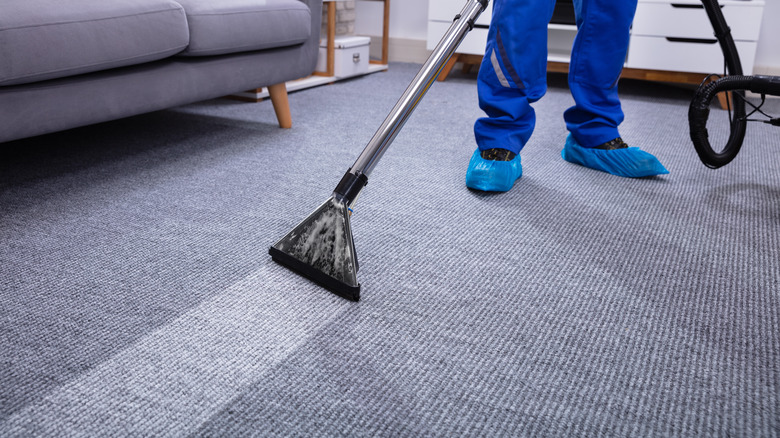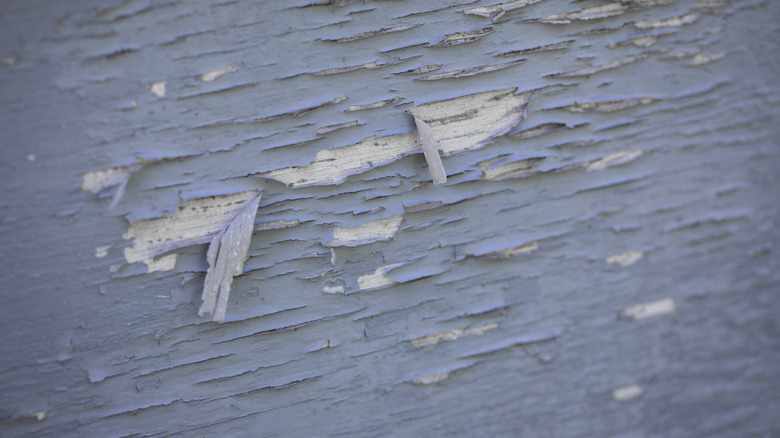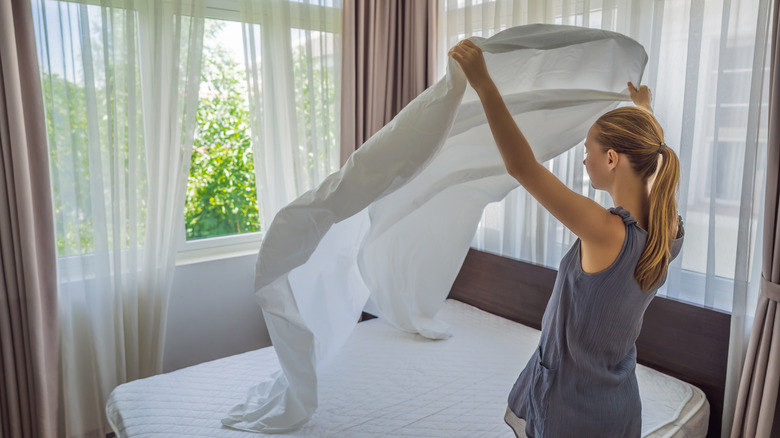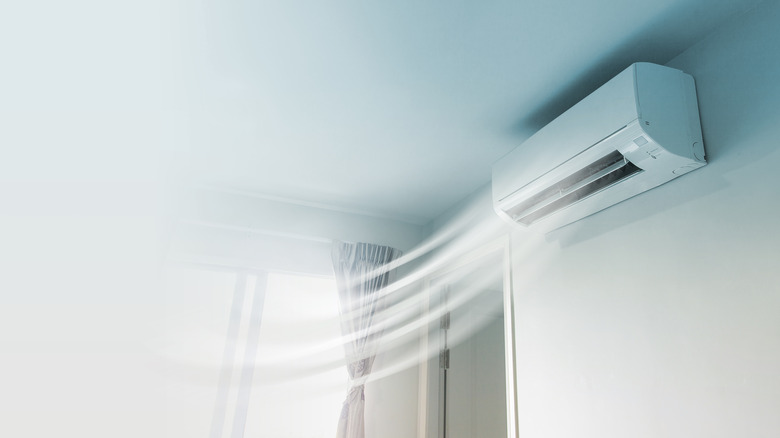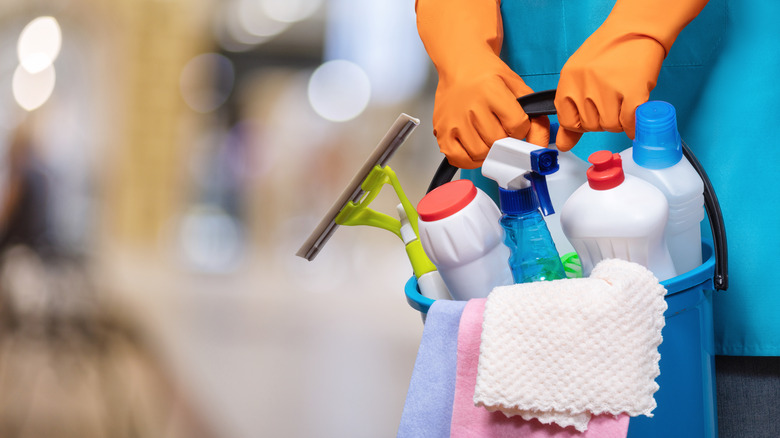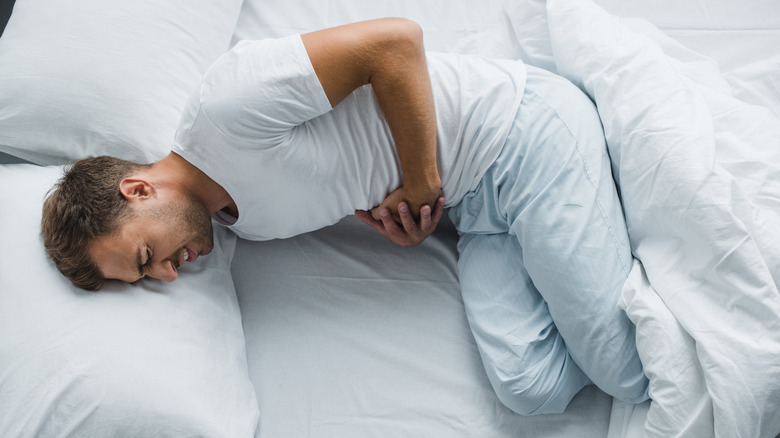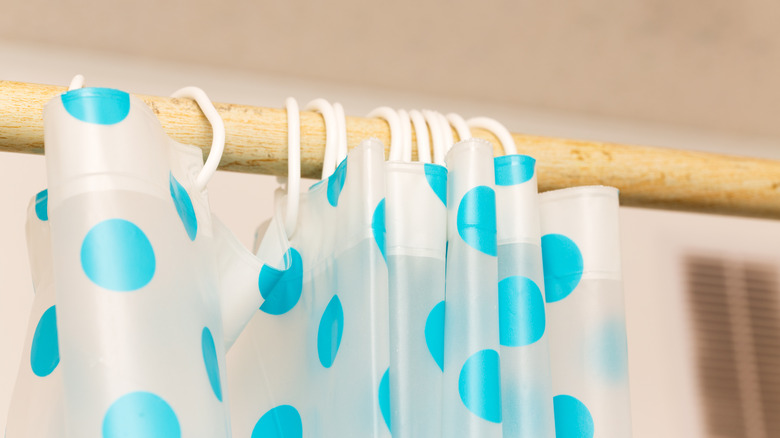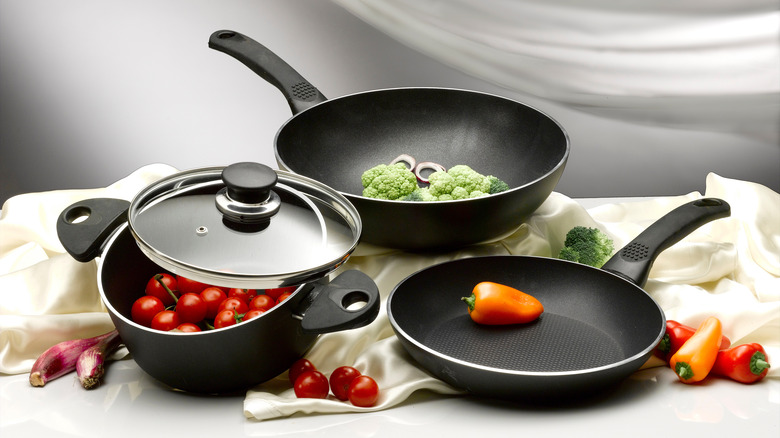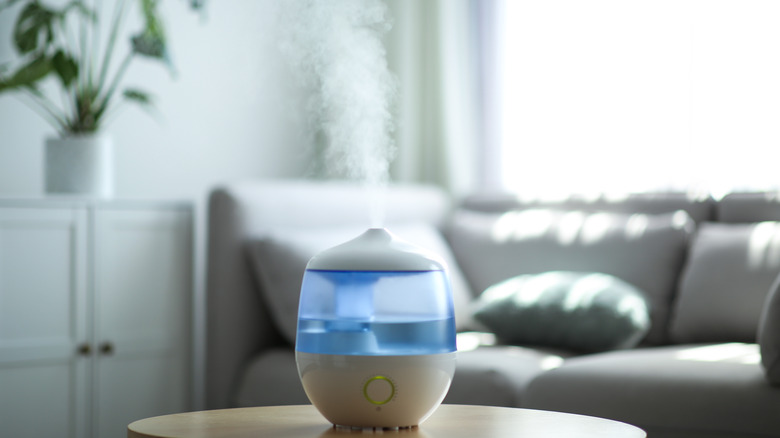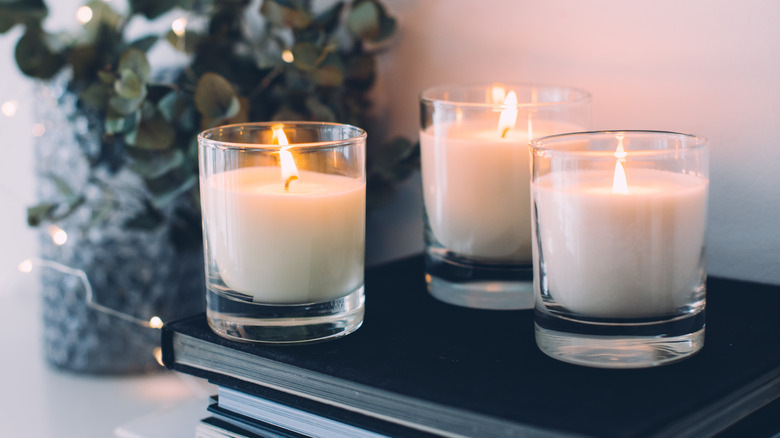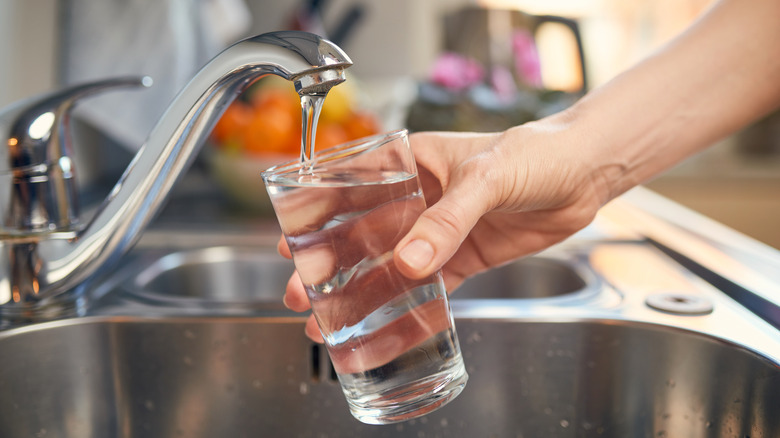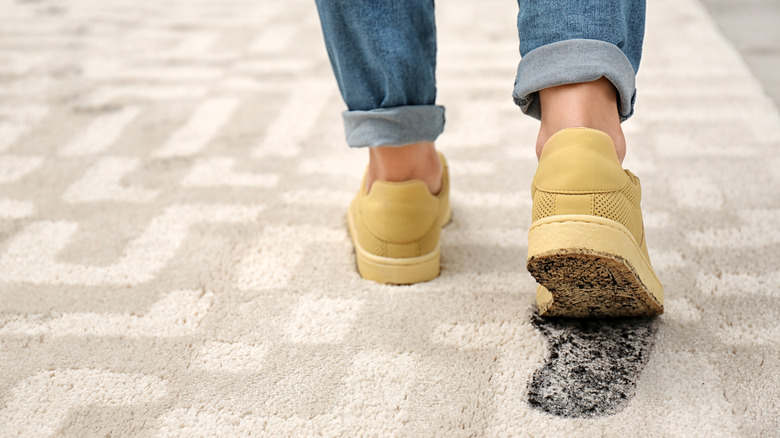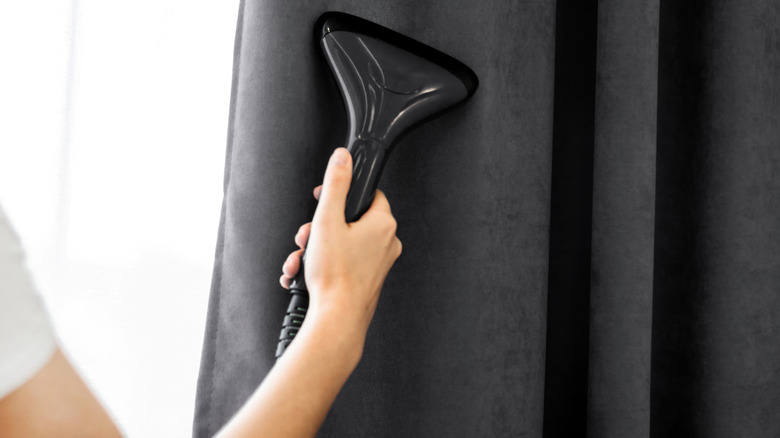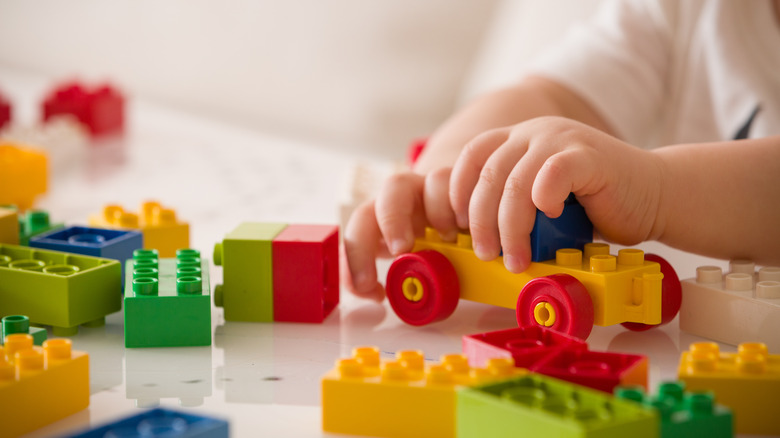Things In Your Home That Might Be Making You Sick
Most people try to keep their homes safe and healthy by doing things like locking the doors, turning off the stove, installing security systems, and even having professional inspectors check out the place before purchasing. But despite all of these major precautions, there are many less obvious dangers in our homes that could actually have a serious impact on our health.
If you can't figure out why you always have a headache or you've been getting sick a lot, it may be time to check out some of the items in your home. Additionally, some outdated household items could be made of toxic materials that can cause more serious health issues like cancer, high blood pressure, and more. Let's get into what things in your home might be making you ill and what you can do to protect yourself and your loved ones.
Your carpet could be home to dust, mold, dust mites, dirt, and more
While carpets and rugs make a home feel, well, homey, they can also house many unwelcome guests like dust, dirt, mold, dust mites, and more. According to WebMD, your carpet can trap these irritants, and "when you clean it or walk on it, those particles can get into the air. The chemicals used to make and install some carpeting could be bad for you, too." And if you're sensitive to these chemicals or dust, you could wind up with contact dermatitis or an allergic reaction (via Healthline).
To avoid having a home filled with irritants and potentially harmful particles, WebMD suggests swapping out carpeting for hard floors. If you like the soft feel of carpet, you can use throw rugs, which are easier to clean than wall-to-wall carpet. If you aren't able to totally rid your home of carpet, WebMD recommends "using a vacuum with a HEPA filter on it at least three times a week, and steam clean it every year." The hard work will be worth a cleaner, healthier home!
There could be harmful lead paint lurking under layers of other paint in your home
When thinking about the potential dangers in our home, something as simple as the paint on our walls feels like it should be harmless. Unfortunately, that isn't always the case. If your dwelling is older, you should double-check that there is no lead-based paint in your living space. According to the United States Environmental Protection Agency, "If your home was built before 1978, it is more likely to have lead-based paint."
In 1978, the government banned the use of lead-based paint, so newer homes shouldn't have this issue. But in older homes, unfortunately, the EPA reports that "lead paint is still present in millions of homes, sometimes under layers of newer paint."
And according to Mayo Clinic, lead poisoning is extremely serious. It takes a toll on our health slowly but surely as it builds up in the body — often over months or years. Mayo Clinic noted, "Even small amounts of lead can cause serious health problems." In adults, these problems include high blood pressure, joint and muscle pain, difficulties with memory or concentration, headaches, and more.
You may not be the only one getting cozy in your bed
At the end of a long day, we all want to curl up and sleep in a clean bed right? Well, unfortunately, our beds can be a breeding ground for dust mites, according to the American Lung Association. Dust mites are microscopic, insect-like pests that can cause allergic reactions and asthma. These unwanted critters can live in our bedding, mattresses, and other upholstered furniture. And that's not exactly what we were hoping for when trying to get a good night's sleep.
However, you can get prevent dust mites. Melissa Maker, founder of Canadian cleaning service Clean My Space, told The Healthy, "The most important thing for dealing with dust mites is to have a mattress protector cover over the mattress, which then prevents dust mites from going into your mattress. Then you can just wash the mattress protector from time to time." She also added that regularly washing your sheets also helps prevent dust mites from accumulating. Totally worth it to keep our beds healthy and clean, wouldn't you say?
Your air conditioning could be circulating contaminated air
Most people use air conditioning every day in the warm months without even thinking about it. It's in most office buildings and living spaces, but could it be making us sick? According to a study in the International Journal of Epidemiology, occupants of air-conditioned office buildings reported more symptoms of ill health than those who worked in buildings with natural ventilation. And in case you're wondering why that is, Dr. Wassim Labaki spoke to HuffPost saying that, "AC systems are susceptible to collect infectious organisms and allergens, such as dust mites. Therefore, the proper maintenance of these systems, including regular filter [changes], is essential to prevent circulation of unhealthy air."
When changing out your AC filters, choose your replacements carefully. Michael Rubino, president of All American Restoration and author of "The Mold Medic," told Health Digest, "It is important to buy the best filters you can buy (as opposed to the cheapest ones). The cheapest ones offer very little protection as they do not filter out small particles such as mold." Rubino also added that the AC system is the "lungs of the home," so it's important to stay on top of all routine filter changes and maintenance.
Your cleaning products could be killing both germs and you
Now this one is surprising because we use cleaning products in our homes to help prevent germs and bacteria from getting us sick. But those very same cleaning products can also have a negative impact on our health for other reasons. According to the American Lung Association, "Many cleaning supplies or household products can irritate the eyes or throat, or cause headaches and other health problems, including cancer." Some products to look out for include aerosol sprays, air fresheners, bleach, detergents, floor polishes, and more.
So, how can we prevent our household cleaning products from having a negative impact on our health? Well, the American Lung Association suggests reading all product labels closely before buying. "Choose products that do not contain or have reduced amounts of VOCs, fragrances, irritants and flammable ingredients. Avoid using air fresheners altogether," the organization advised. There are also safer cleaning options out there like soap and water, baking soda, and vinegar. These alternatives can do the trick without all the harsh chemicals.
The food in your home can cause foodborne illness if necessary precautions aren't taken
When looking at potential dangers in our home, we don't only have to consider what lives on surfaces, what particles are in the air, and what harsh chemicals are in our products — we also have to think about what we're putting into our bodies, aka our food.
According to the Centers for Disease Control and Prevention, "Every year, an estimated 1 in 6 Americans (or 48 million people) get sick, 128,000 are hospitalized, and 3,000 die of foodborne diseases." Yes, food has the potential to make us extremely, even fatally, ill if not handled properly. Thankfully you don't have to be a trained chef to protect yourself and your loved ones from foodborne illness.
Some basic food safety tips to try for when cooking and storing food at home: Keep your fridge below 40 degrees Fahrenheit, clean surfaces after handling raw meat, and check expiration dates on all food products. The CDC also recommends four specific ways to prevent food poisoning at home: Clean your hands and work surfaces, separate raw meats from ready-to-eat foods, cook food to the right internal temperature to kill harmful bacteria, and refrigerate leftovers in a properly chilled fridge within two hours of cooking. Following these steps will help prevent foodborne illnesses. Your stomach will thank you!
Plastic shower curtains can harbor mold and mildew
Taking a nice, hot shower can be a source of peace and a stress-free place for so many people. It's also how we clean our bodies, so we assume the space is clean too, right? Sure, until you realize that your shower curtain can be a breeding ground for all sorts of nastiness. Thankfully, you don't have to panic. There are some pretty simple solutions to make your shower a healthier, cleaner space.
Physician Jeffrey Brown told the Cleveland Clinic that while mold and mildew can grow on plastic shower curtains, most healthy people don't have to worry about getting sick from it. On the other hand, if you are immunocompromised, it definitely could cause some unwanted symptoms. As such, Dr. Brown suggests "replacing your shower liner every six months to a year. Alternatively, you can pop it in the washing machine and run a rinse cycle with bleach or vinegar. Then, hang it on the line outside or back in the shower to dry." Mold and mildew aren't always visible to the naked eye, but if your shower curtain is noticeably starting to turn a reddish color or even green or black, it's definitely time for a new one (via Healthline).
You might want to get rid of any old nonstick pans
Nonstick pans have been a controversial kitchen item for a while now, with many raising concerns over their safety (via ABC News). And this wasn't without reason. According to Healthline, nonstick cookware, especially Teflon, have been investigated to determine their safety. In case you aren't familiar with Teflon, it's used to coat a variety of products like pans because it's "waterproof, cuts down on friction, and creates a nonstick surface," per Healthline.
But the concerns over nonstick pans and whether or not they increase risk for health issues like cancer don't have to do with Teflon itself. Instead, it has to do with perfluorooctanoic acid, which is a chemical that has been used in the manufacturing process of Teflon. Healthline reports that PFOA has been linked to a variety of health conditions like thyroid disorders, chronic kidney disease, infertility, liver disease, and cancer.
Since 2013, all Teflon-branded nonstick pans are now required to be PFOA-free. This means your newer non-stick pans should be safe. If you have old nonstick pans, however, it's a good time to swap them out for some new ones. Better safe than sorry!
Humidifiers could be blowing mold spores into the air your breathe
Humidifiers can help add moisture to the air to prevent dryness that can cause irritation, but they can also be home to unwanted mold. Michael Rubino, president of All American Restoration and author of "The Mold Medic," told Health Digest, "Humidifiers can become contaminated as they become a constant source of moisture." Rubino added that once mold and bacteria begin to grow, the humidifier could just be constantly blowing spores into the air you breathe. Dr. Aileen M. Marty, an infectious diseases professor, agrees. She told Yahoo that 75% of samples from humidifiers showed fungus and 87% showed bacteria.
So how do we get the benefits of humidifiers without unwanted pathogens blowing into the air we breathe? Well, Rubino suggests cleaning them regularly so that they do not become a breeding ground for mold. If you use humidifiers regularly, "be sure to keep an eye on the humidity levels ensuring they do not surpass 60%," he continued. When the levels pass 60% is when bacteria, fungi, and other germs are more likely to colonize.
Candles aren't as relaxing when you know what they can do to your body
Candles can help cultivate a zen vibe in your living space, but you may not feel as relaxed after learning about the negative impact many candles can have on our health. Naturopathic doctor Erica Steele told Eat This, Not That that many store-bought candles "contain many volatile organic compounds and omit soot as well as VOCs." Dr. Steele added that breathing in these particles from burning candles may cause unwanted health effects like "eye, nose and throat irritation, headaches, [and] loss of coordination and nausea," although more research is needed.
Thankfully for candle lovers, there are some safer, non-toxic candle options out there like soy candles. Healthline also recommends candles made from beeswax, coconut wax, palm wax, and vegetable wax. However, the site cautioned, "Inhaling any type of smoke can be unhealthy. If you plan on using candles regularly, it's a good idea to burn them in a ventilated room to minimize the amount of smoke you breathe in."
Even filtered tap water can be unsafe
Ever wonder what's in the tap water in your home and if you should be filtering it? Well, Lara Adler, an environmental toxins expert, spoke with The Healthy and revealed the unsettling truth about unfiltered tap water. Adler said, "Some 77 million Americans currently drink water that has violated the Safe Drinking Water Act due to excessive contamination."
The United States Environmental Protection Agency also explained that drinking water with unsafe levels of contaminants can cause negative health effects like, "gastrointestinal illnesses, nervous system or reproductive effects, and chronic diseases such as cancer."
In order to avoid these health issues, Adler suggests filtering your water and testing it even after filtering. This is because not all filters remove all contaminants. The EPA has an entire fact sheet with info about whether or not you should have your water tested and how to go about getting your county health department to test your water.
Your shoes can carry fecal matter into your home
In some cultures, taking your shoes off before you enter someone's home is a sign of respect, but it also has to do with cleanliness. On the cleanliness front, it's because our shoes are unsurprisingly filthy. According to a study by Dr. Charles Gerba, a microbiologist and professor at the University of Arizona, your shoes carry a lot of bacteria both outside and inside the shoe (via Eat This, Not That). And if the thought of that isn't enough to make you cringe, the study found that 96% of the bacteria found on shoes was fecal matter (both human and animal). This can come from places like public restrooms or outside on the grass. So when you wear your shoes in and around your house, unfortunately, all that bacteria tracks along everywhere with you.
Luckily, there's a quick fix for keeping this bacteria out of your home. Have yourself and your guests take their shoes off before entering the house. Additionally, cleaning your floors regularly and washing your hands after taking off your shoes will help make sure that nasty bacteria stay outside, not inside.
Your curtains could be making you sick for a variety of reasons
Curtains aren't the first place that most people would expect unwanted mold and bacteria to grow in their homes, but it happens more often than you'd think. According to WebMD, curtains can harbor everything from pet dander to dust mites to mold. And Michael Rubino, president of All American Restoration and author of "The Mold Medic," told Health Digest that it's the curtains' porosity that allows them to house these toxins.
To solve this household problem and avoid getting sick from unwanted pathogens in our homes, WebMD suggests having blinds instead of curtains because they can be dusted more easily. And if you do have curtains, Rubino recommends "sending them out to be cleaned by a textile company (that cleans curtains, rugs, etc). If you've had your curtains up for years and haven't cleaned them, now is a good time to look into it."
And as if that all wasn't enough to make you think twice about your curtain, a University of Oregon study revealed that keeping your curtains closed all the time could also contribute to illness because darkness provides an environment in which bacteria can thrive (via The Jakarta Post).
Could your kids' toys be making them sick?
Children's toys can not only be a home for cold and flu bacteria, but also toxic pathogens. Lead research specialist at the University of Georgia, Richard Bearden II, told the Daily Mail that toys are a major channel of transmission of viral diseases among children. Bearden said, "People don't really think about getting viruses from inanimate objects. They think about getting them from other people. Children are vulnerable to contracting infectious diseases because they put their hands and foreign objects in their mouths, and their immune systems aren't fully developed." He added that toys in shared play areas like schools, doctors offices, and daycare centers are often even more contaminated than toys in the home.
I addition to toys, other kids' products like sippy cups also can harbor harmful bacteria, Michael Rubino, president of All American Restoration and author of "The Mold Medic," told Health Digest. And since children often put both toys and sippy cups in their mouth, Rubio suggests, "If you ever notice puncture marks on your children's toys, sippy cups, or binkys from their teeth that could cause moisture to become trapped, it's time to replace them."

